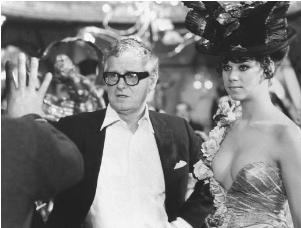Basil Dearden
| Basil Dearden | |
|---|---|
 |
|
| Born |
Basil Clive Dear 1 January 1911 Westcliff-on-Sea, Essex, England |
| Died | 23 March 1971 (aged 60) Hillingdon, London, England |
| Years active | 1938–1970 |
| Spouse(s) | Melissa Stribling |
Basil Dearden (born Basil Clive Dear; 1 January 1911 – 23 March 1971) was an English film director.
Dearden was born at 5, Woodfield Road, Leigh-on-Sea, Essex to Charles James Dear, a steel manufacturer, and his wife, Florence née Tripp.
Dearden graduated from theatre direction to film, working as an assistant to Basil Dean. He later changed his own name to Dearden to avoid confusion with his mentor.
He first began working as a director at Ealing Studios, co-directing comedy films with Will Hay, including The Goose Steps Out (1942) and My Learned Friend (1943). He worked on the influential chiller compendium Dead of Night (1945) and directed the linking narrative and the "Hearse Driver" segment. He also directed The Captive Heart starring Michael Redgrave, a 1946 British war drama, produced by Ealing Studios. The film was entered into the 1946 Cannes Film Festival. The Blue Lamp (1950), probably the most frequently shown of Dearden's Ealing films, is a police drama which first introduced audiences to PC George Dixon, later resurrected for the long-running Dixon of Dock Green television series. His last Ealing film, Out of the Clouds, was released in 1955.
In later years he became associated with the writer and producer Michael Relph, and the two men made films on subjects generally not tackled by British cinema in this era. These included homosexuality (Victim, 1961) and race relations (Pool of London, 1951; Sapphire, 1959). In the mid to late 1960s Dearden also made some big-scale epics including Khartoum (1966), with Charlton Heston and Laurence Olivier, and the Victorian era black comedy The Assassination Bureau (1969), again with Michael Relph.
...
Wikipedia
